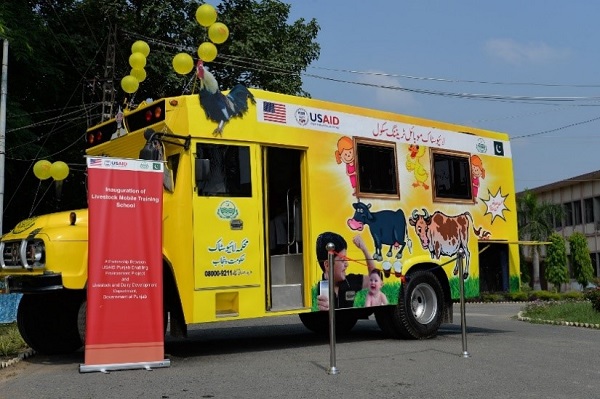Sep 27, 2018 | by Muhammad Junaid and Frenki Kozeli, Chemonics

The development community has long been in pursuit of partnerships with public and private sector actors to improve market systems. At its best, these partnerships result in more inclusive and more sustainable market systems interventions. In Pakistan, the USAID Punjab Enabling Environment Project (PEEP) leveraged the power of partnerships to create a platform for women’s economic empowerment in the livestock sector.
Nearly a quarter of Pakistan’s gross domestic product is linked to the agriculture sector, and 55 percent of this sector is livestock. Despite its importance, the productivity per animal in terms of milk and meat yield is among the lowest in the region. Small farmers and specifically rural women make up the vast majority of producers in the livestock sector, mainly concentrated in the southern districts of Punjab. It naturally followed that the key for boosting the productivity of the livestock sector was in the technical and economic empowerment of women in these value chains.
Improving the livestock sector was never going to be a one-activity solution. USAID PEEP did not seek to directly provide the many services the farmers in the livestock sector required since the sustainability of the interventions would be dubious, to say the least. Instead, the project stepped back to analyze the incentives of the market system actors that touched the livestock sector—many of them already project partners—and addressed their pain points in providing more inclusive services. USAID PEEP’s role was to convene and align the incentives of all its partner market systems actors for achieving women’s economic empowerment. Most critically, these actors entered a formal joint-partnership with one another, not just the project. These partners, now engaged with one another through an initiative dubbed WEinSPIRE, provided well-rounded services to women livestock farmers in southern Punjab, including:
As the market system matures, the different actors have started interacting independently developing new linkages and initiatives. During the Progress through Partnerships: Engaging Market Actors for Women’s Empowerment session at #SEEP2018, we’ll be taking a deep dive into the WEinSPIRE partnership platform, talking through the actors, their incentives, and how the partnership model has been scaled. We’ll also be discussing a different partnership model for women’s empowerment, led by MEDA, and reflecting on how these initiatives fit into a broader development strategy for women’s empowerment.
This post was authored by Muhammad Junaid, chief of party of the USAID Punjab Enabling Environment Project (PEEP), and Frenki Kozeli, a manager on Chemonics’ Economic Growth and Trade Practice.
Categories: Food Security Women and Girls English Blog Womens Economic Empowerment Blog Agriculture & Food Security Blog WebinarsBlogs

1621 North Kent Street, Ste 900,
Arlington, VA, 22209
P 202.534.1400
F 703.276.1433
Website Photos: © mari matsuri
